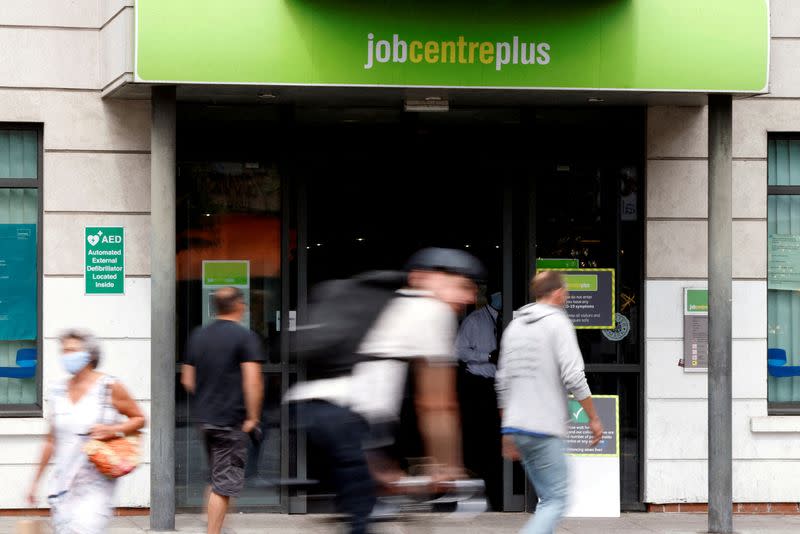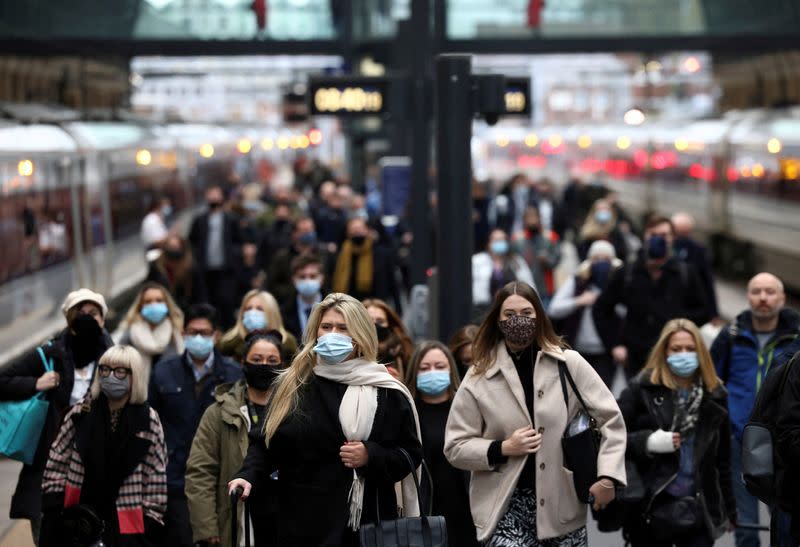UK jobs market loses some of its inflation heat
By William Schomberg and David Milliken
LONDON (Reuters) - Britain's jobless rate rose for the first time since late 2020 and other measures of the country's hot labour market cooled, potentially easing inflation worries at the Bank of England which is due to raise rates again this week.
With surging inflation weighing on the economy's recovery from the COVID-19 pandemic, official data showed the jobless rate edged up to 3.8% in the three months to April from 3.7% in the previous labour market report for the three months to March.
The increase was the first since the last three months of 2020. Economists polled by Reuters had expected the unemployment rate to fall to 3.6%.
The rise partly reflected a drop in the economic inactivity rate for working-age adults, which measures people who have dropped out of the labour market altogether and therefore had not shown up as unemployed.
It fell by 0.1 percentage points to 21.3% for the February to April period, driven mostly by students seeking work.
"We may be nearing a turning point for the labour market as creeping uncertainty results in employers taking their foot off the accelerator," Jack Kennedy, an economist at recruitment website Indeed, said.
Although growth in vacancies slowed, they hit a new record high and the fall in the inactivity rate still left it well above pre-pandemic levels, meaning the jobs market remained extremely tight, Kennedy said.
Sterling slipped against the dollar after the data and shorter-maturity British government bond yields eased off recent multi-year highs as investors dialled back their expectations for how much higher the BoE is likely to raise borrowing costs.
The British central bank is expected to raise interest rates again on Thursday as it tries to stop the recent jump in inflation from turning into a longer-term problem if employers resort to increasing their pay sharply to fill vacancies.
Data on Monday showed Britain's economy unexpectedly shrank in April, adding to fears of a sharp slowdown.
GRAPHIC: UK jobless rate rises for first time since 2020 (https://graphics.reuters.com/BRITAIN-ECONOMY/UNEMPLOYMENT/zjpqklqdkpx/chart.png)
INCOME EROSION
A further 177,000 people were employed in the three months to April compared with the previous three-month period, more than the median forecast for a 105,000 increase in the Reuters poll, while the number of unemployed fell by 47,000.
In April alone employment fell by 254,000 and the jobless rate jumped to 4.2% from 3.5% in March, although single-month figures can be volatile as a measure of the economy.
Tuesday's data showed growth in regular pay picked up slightly to 4.2% in the three months to April, despite expectations that it would slow. But growth in total pay, including bonuses, slowed to 6.8% from 7.0%.
Many employers have resorted to one-off incentives to attract and retain staff.
Despite the relatively high levels of pay growth, incomes of workers are being eroded by the recent leap in inflation caused by the reopening of the global economy after the coronavirus pandemic and Russia's invasion of Ukraine.
Using Britain's consumer prices index, real-terms total pay was 0.5% lower than a year before, the biggest drop since August 2020 when many workers were on reduced furlough pay.
Stripping out bonuses, pay fell 3.0%, the largest such inflation-adjusted drop since November 2011.
Looking at April alone - which the ONS discourages due to the low number of workers sampled - pay excluding bonuses dropped by the most since these records began in 2001.
(Reporting by William Schomberg and David Milliken; Editing by Catherine Evans)

 Yahoo Finance
Yahoo Finance 

